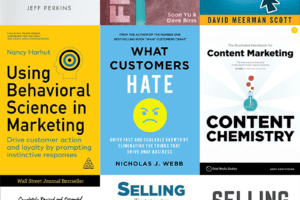Episode 36 of The Verblio Show
What happens if Zucks gets a whim to change the algorithm?
“You gotta pivot and figure something else out.”
On this episode, Steve talks with Kelli Kelley, founder and CEO of brndMethod digital agency. They talk about navigating the changing world of digital, when and why to rebrand, and both the good and bad that have come out of recent efforts towards inclusion and diversity. She also shares her insight on the difficulty of proving ROI and what makes an ideal—and not-so-ideal—client.
Guest-at-a-Glance
Name: Kelli Kelley
What she does: Founder and CEO of brndMethod, a digital marketing agency based in Atlanta.
Find Kelli on the web: brndMethod | LinkedIn
Get smart: “The best piece of career advice I’ve ever been given was to not take things personally.”
Top Takeaways
Manage expectations around digital
“As marketers we have to manage expectations. There’s nothing immediate,” Kelli says. That can be difficult when working with C-suite executives who are used to 90-day cycles and quick returns. Transparent communication around what you’re doing and what results you’re expecting to see is crucial for your long-term partnership with any client.
In recent years, social media has moved more towards brand marketing than click-driven ROI. This means if you have a client expecting immediate results from a new Facebook strategy, you’ll need to set them straight.
“You have to build brand, you have to create more touch points in this space,” Kelli explains. “This space doesn’t work the same as it worked six months ago. And it may not work the same as other traditional marketing. So it’s not gonna fit in your neat little box—you have to be patient.”
Vet your client’s organizational structure
One of Kelli’s biggest red flags for working with a client is a lack of solid internal structure. If there isn’t one key person in the organization that your agency will be working with, you’re not going to have anyone owning the process in the way you need for a successful partnership.
Kelli tells of one client that was exciting upfront, but quickly showed they weren’t as committed to digital as they’d said. “It was always just chasing down the CEO who was super busy, and nobody in the company seemed to have any real direction,” she recalls. Now, she wants to know with any new client: “Who are we gonna be reporting to? What’s the structure? What positions our field?”
Episode Highlights
On resiliency and fire
“As a black woman, you’re quite frankly a double minority. And so you’re kinda considered at the bottom after everyone else. And after awhile, in your adult life you develop a certain resiliency. And you can’t lose your fire. Even under the most demeaning and disrespectful circumstances, you still have to have that fire in you to push for your goals.”
Digital over PR
“Digital started gaining traction and I was like, ‘Oh my God, I feel like this is what my PR clients want. They want this way to get their message out.’ PR is super volatile. You can pitch for months and it never gets picked up, but with this Facebook thing, this Twitter thing, you can just get it out there.”
How brndMethod drives results for its clients
“We really focus on aligning our strategies with the sales goals. A lot of creative agencies or digital just say, ‘Hey, this is the marketing piece. If that sells some stuff, great, I don’t have anything to do with that.’ Whereas we’re not closers obviously, but one of the first conversations we have is with the sales team asking, ‘What are the pain points?’ Because we need to do creative that speaks to that.
We don’t need to just bombard LinkedIn and Facebook with ‘This is what we do.’ Nobody cares. Who are we talking to? What’s the messaging that they’ll respond to and what are their pain points? And then we work backwards from that.”
The importance of playing ball
“These platforms are their own beast. … You’re not gonna get Facebook, Instagram, Twitter, LinkedIn, and just say, ‘Yeah, no more algorithm changes, we’ll just keep it like it is.’ It’s just not gonna happen.
I tell people, ‘Listen, you have to feed the beast.’ If you’re saying, ‘Oh, I don’t do video’—well, let me tell you something. Video is prime spot, and once you get prime spot and you show that you’re willing to play ball with these platforms, then they show your stuff more. ‘Well, I don’t wanna be on Instagram Reels.’ Well, let me tell you about the organic traffic that’s happening there. You can’t get rigid.”
Kelli’s ideal client
“The only criteria we really have is that a client is open to digital as a functioning true part of their strategy. Not a ‘nice to have,’ not a ‘maybe,’ not a ‘we could take it or leave it,’ but they understand how impactful it can be. And maybe they don’t even understand totally, but they’re open to it. We don’t work with people that are just so rigid and so unwilling to try different things.
…We enjoy being able to work with clients that appreciate creativity. We do not want to take your tri-fold brochure and post snippets on social media. That’s not what we want to do. We want to be able to have creative execution that contributes to the bottom line.”
Why changing company culture can be so hard
“If you think about it, your average CEOs are 50, 60 years old. When you’re 50, 60, 70 years old and you are a white male, you are prone to certain biases—checked, unchecked, whatever. You come from a different time. And that’s not a blame thing, it’s just a reality. You have to think about the years, right? Maybe you went to segregated school. What did you hear in your home growing up? What were you taught about people of color? You didn’t grow up in a really integrated time.
So now that you’re in a position of power, you may not always feel able to make that effort, but it needs to be made. Companies need to adopt that culture from the top. And that’ll be difficult, that’s gonna be hard, but it has to happen because the world is changing.”
Top Quotes
Kelli:
[2:45] “The best piece of career advice I’ve ever been given was to not take things personally.”
[9:53] “If Zucks gets a whim to change the algorithm, you gotta pivot and figure something else out.”
[15:58] “You can’t just draw a line in the sand and say what you’re not gonna do when a new feature comes out. You have to be willing to try.”
[17:58] “Storytelling is so important now. You’re not gonna get by just barking to the digital sphere about what you do. You have to storytell, and that’s what we like to do.”
[33:40] “As creative as we all like to be, the structure [of branding] to me is fairly black and white.”
Learn More
Traction by Gino Wickman.
Kelli’s take: “It gives you a strong focus on how to properly structure your company and how to stay on task. I was struggling with that personally, and I wanted to be more efficient and grow a stronger business. And I knew that I needed help in that area, and the book just really breaks it down. It was exactly what I needed.”
The Talking Sopranos podcast.
Kelli’s take: “They basically just go episode by episode and give you background and it’s super intriguing.”



